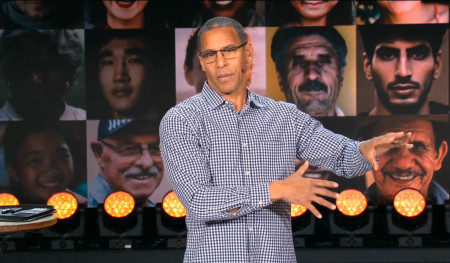Pastor Miles McPherson speaks on the ‘third option’ to fight racism

Pastor Miles McPherson of California’s Rock Church on Saturday spoke at the National Weekend of Action for Faith & Prejudice, a movement to demonstrate faith in God through confronting and dismantling racism, where he talked about the “third option,” based on his book.
During the Facebook Live event, McPherson referred to his book, The Third Option: Hope for a Racially Divided Nation, and said he’s often asked what the other two options are.
They are, he said, the us-versus-them approach, and the for-or-against culture. “Culture forces you to pick one against the other."
The third option is, “We give honor or value to what we have in common,” he stressed, noting that people have more similarities than differences.
One of the common things, he said, is that we are all made in the image of God.
“The image of God in me is not superior to the image of God in you. And the image of God in you is not superior to the image of God in me, or inferior,” he told viewers.
Racism, he explained, is “when I believe the image of God in you is less than the image of God in me.”
So the third option is, he added, “I see you as being made in the image of God equally as I am, and that God loves you equally as He does me.”
McPherson quoted Genesis 4:9, which is about the first murder in the Bible. It “happened because someone was not being his brother’s keeper,” he said.
The verse reads, “Then the Lord said to Cain, ‘Where is your brother Abel?’ ‘I don’t know,’ he replied. ‘Am I my brother’s keeper?’”
“If we do not keep each other, we’ll continue to have death and division,” the pastor said.
To keep doesn’t mean pointing out that someone is a “sellout” or their failures. “It’s lifting people up ... to be more loving, more understanding ... to invest in the emotional and spiritual health of your neighbor,” he added.
The focus, McPherson said, is not on being a racist, but to be a keeper.
There are three principles to being your brother’s or sister’s keeper, he said.
One, a brother’s keeper must have a brother to keep.
He read out Proverbs 18:24, “One who has unreliable friends soon comes to ruin, but there is a friend who sticks closer than a brother.”
The pastor then asked who is the person, or a group of diverse people, in your life?
Two, McPherson continued, a brother’s keeper must “focus on doing right, not being right.”
It’s not about winning an argument that you’re right and the other person is wrong, as that would be the us-versus-them culture, the pastor cautioned. “It’s about mutuality … That’s loving your neighbor as yourself.”
Three, he added, a brother’s keeper must “keep” as long as it takes.
People don’t change overnight, he explained, noting that he’s 60 and still learning and God has not given up on him.
McPherson then read Genesis 4:13-15: “Cain said to the Lord, ‘My punishment is more than I can bear. Today you are driving me from the land, and I will be hidden from your presence; I will be a restless wanderer on the earth, and whoever finds me will kill me.’ But the Lord said to him, ‘Not so; anyone who kills Cain will suffer vengeance seven times over.’ Then the Lord put a mark on Cain so that no one who found him would kill him.”
God did not throw Cain out but told him that He would protect him, give him time to repent, the pastor explained.
Make a covenant with people who you will keep, McPherson concluded. “Don’t have a contractual relationship that you do this (then) I do this, and if you don’t do this (then) I’m not doing this.”
Following McPherson’s talk, Ryan Collins, CEO of Bethel School of Technology, shared why he got involved in the Faith & Prejudice movement.
After the police-involved death of George Floyd in May, Collins said he started asking himself what he could do to eradicate racism. He said some fellow white people he spoke to at the time were struggling with the same question.
It then occurred to Collins that a Heaven-to-Earth approach was needed because the fight is against an evil spirit.
Collins then spoke to Nona Jones, the founder of Faith & Prejudice, whose social media posts had stirred him. As a result, this grassroots movement began, said Collins, who is now co-executive producer of Faith & Prejudice.
Collins stressed that it’s not a political movement; “it’s a heart-of-the-Father movement.”
Jones, who opened the Facebook Live event, said the movement is about directing people’s passions and anger “in a direction that leads to lasting change.”
The future of the movement against racism hinges on leadership, she added.





















